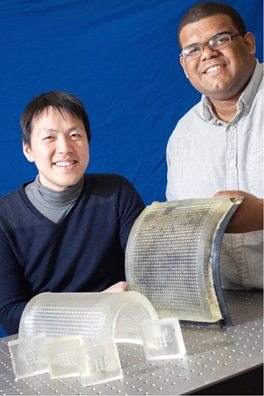Columbia Engineering Team led by Shree K. Nayar, T.C. Chang Professor of Computer Science, has developed a novel sheet camera that can be wrapped around everyday objects to capture images that cannot be taken with conventional cameras. The team designed and fabricated a flexible lens array that adapts its optical properties when the sheet camera is bent. This enables high quality images from the camera with each new sheet deformation.

“Cameras today capture the world from essentially a single point in space,” says Nayar. “While the camera industry has made remarkable progress in shrinking the camera to a tiny device with ever increasing imaging quality, we are exploring a radically different approach to imaging. We believe there are numerous applications for cameras that are large in format but very thin and highly flexible.”
A Flexible detector array and a thin optical system to project high quality image, are the two technologies required for the “Flex-cam”. The traditional approach to attach a fixed focal length lens, would result in gaps between the individual lenses. The team developed an adaptive lens array, from elastic material. It enables the focal length of individual lenses, to vary with the curvature in the sheet. This is an automatic response, and hence no complex electrical or mechanical mechanisms to control the lenses.
The team fabricated their prototype lens array using silicone and demonstrated its ability to produce high image quality over a wide range of deformations. The research was conducted in Nayar’s Computer Vision Laboratory and funded by the Office of Naval Research.
“The adaptive lens array we have developed is an important step towards making the concept of flexible sheet cameras viable,” Nayar says. “The next step will be to develop large-format detector arrays to go with the deformable lens array. The amalgamation of the two technologies will lay the foundation for a new class of cameras that expand the range of applications that benefit from imaging.”
Source: Columbia University







